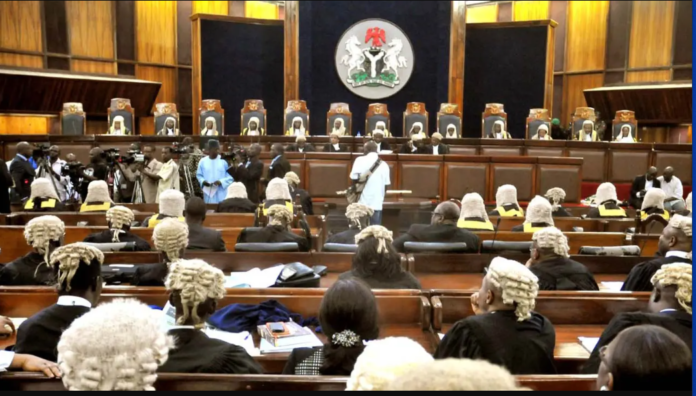Lawyers criticise court ruling allowing someone with dual citizenship to become Governor
By Jeph Ajobaju, Chief Copy Editor
Concerned Lawyers, a civil society group dedicated to the rule of law and safeguarding national interests, has expressed concern over the Supreme Court judgment allowing individuals with citizenship allegiance to other countries to be Governors in Nigeria.
“This ruling challenges sections 182 (1) (a) and 187(1) and (2) of Nigerian Constitution, 1999 (as amended), which disqualifies those who have acquired foreign citizenship or declared allegiance to another nation from occupying office of governor,” Concerned Lawyers spokesman Jide Oni said.
“Allowing leaders with dual allegiance raises questions about national security, especially when considering the oath of allegiance required in United States, where individuals swear to defend U.S. Constitution against all enemies.
“In the event of a conflict, whose Constitution will [such] a Governor uphold? This uncertainty poses a severe threat, particularly in a country grappling with insecurity that has claimed thousands of lives.
“The issue of dual allegiance intertwines with endemic corruption. Nigerian politicians have exploited dual citizenship to stash ill-gotten wealth abroad, evading accountability and perpetuating corruption.
“This trend undermines the development of the nation, as elites prioritise personal interests over critical socioeconomic challenges.”
Oni urged stakeholders, including the National Assembly and civil society “to engage in a dialogue addressing these concerns. It is crucial to ensure that constitutional provisions are upheld to maintain the integrity, national security, and socioeconomic interests of Nigeria.”
__________________________________________________________________
Related articles:
BREAKING: Supreme Court affirms Sanwo-Olu’s election as Gov of Lagos State
VIDEO: ‘Useless boy,’ Sanwo-Olu replies traffic violator who tells him, ‘I’m a soldier Oga Sir’
BREAKING: Sanwo-Olu signs N2.267tr 2024 budget
__________________________________________________________________
What the Constitution says on dual citizenship
“Section 28 (1) of the Constitution says, “Subject to other provisions of this section, a person shall forfeit forthwith his citizenship if, not being a citizen of Nigeria by birth, he acquires or retains the citizenship of or nationality of a country, other that Nigeria, of which he is not a citizen by birth.”
Section 66 (1) says, No person shall be qualified for election to the Senate or the House of Representatives if –
“(a) Subject to section 28 of this Constitution he has voluntarily acquired the citizenship of a country other than Nigeria or, except in such cases as may be prescribed by the National Assembly, has made a declaration of allegiance to such a country.”
Supreme Court ruling on dual citizenship
A panel of Justices of the Supreme Court on January 12 unanimously affirmed the election of Lagos Governor Babajide Sanwo-Olu after dismissing the separate appeals filed by the Peoples Democratic Party (PDP), the Labour Party (LP), and their governorship candidates.
Both Abdul-Azeez Adediran, popularly known as Jandor (of the PDP) and Gbadebo Rhodes-Vivour (of the LP) had anchored their appeals on their argument that Sanwo-Olu’s nomination by the All Progressives Congress (APC) was invalid because his running mate, Obafemi Hamzat, was ineligible to run as he holds a dual citizenship of Nigeria and the United States.
But Justice Lawal Garba, a member of the Supreme Court panel, held that by virtue of Section 177 of the Constitution, a citizen by birth who has attained 35 years of age and has a school certificate is qualified to vie for office of Governor.
A person who is a citizen of Nigeria by birth is clearly entitled to contest any election in Nigeria, Garba stressed.
In his consenting opinion, Justice Emmanuel Agim, ruled: “The Lagos State Deputy Governor’s declaration of allegiance to the United States does not rob him of his right to vie for elective office in Nigeria as a citizen by birth.”
Justice Adamu Jauro, who delivered the lead decision, said the election petition tribunal which conducted the trial failed to determine the merit of the petition submitted to it.
He insisted the Supreme Court could not determine the merit of the appeal because the time frame of 180 days within which the petition must be determined had lapsed.
“This appeal is devoid of any merit, and it is accordingly dismissed,” Jauro declared.
Other Justices on the panel consented to the decision.











